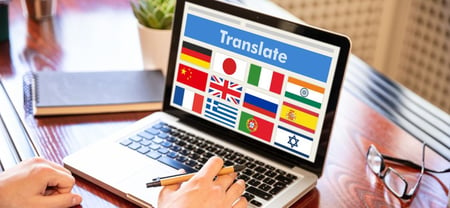
You need to get your website translated so that you can expand into new markets or capitalize on new customers in your existing marketplace (did you know CBS reported that almost 45% of the people in California speak a language other than English at home?).
That’s the challenge, and it’s a common challenge, but where do you start in your search?
First thing’s first - you need to partner with a Language Service Provider (LSP), instead of an individual translator, because they’ll regard the project as a whole and not simply provide a translation.
At Lingualinx, we understand that wading into this territory can be tough, especially when you start talking to LSPs and they throw around terms about their experience and qualifications that can seem like overwhelming jargon.
But it’s not jargon. It’s just that LSPs understand their industry, even though they’re not always the best at communicating about it.
In this article, we’ll talk in simple English, cut through the industry fog, and explain the seven qualifications you need to look for when getting a partner to translate your website.
1. Is the LSP ISO 17100 and ISO 9001 Accredited?
The International Organization for Standardization (ISO) is renowned for its development and publication of international standards across industries.
ISO 17100 is the translation services industry certification, signifying an LSP's dedication to translation excellence. Yet, ISO 9001 accreditation is equally crucial. ISO 9001 is a universally recognized quality management standard applicable to organizations of all sizes.
ISO 9001 ensures that an LSP has established robust quality management systems, consistently adhering to global best practices. It emphasizes continuous improvement, assuring clients of consistent quality. ISO 9001 serves as the foundation for ISO 17100, reinforcing that an LSP's processes are not only standardized but continually optimized.
When seeking an LSP, prioritize those with both ISO 17100 and ISO 9001 accreditation. These certifications guarantee adherence to industry standards and a commitment to continuous improvement, ensuring the highest quality for your website translation project.
2. Is the LSP Part of the Association of Language Companies (ALC)?
There are regional language bodies in various worldwide territories that recognize the professionalism of certain companies by allowing them into their membership.
In the USA, the Association Of Language Companies (ALC) “provides a detailed and thorough set of meticulously established guidelines.”
Beyond the guidelines, being a part of the ALC shows that the company is taking an active role in staying up-to-date with the industry and often helping to shape it. Its members don’t just want to successfully work for their clients, they care about the integrity of the language services industry as a whole.
3. Do They Have Quality Assurance Process Qualifications?
A strong Quality Assurance (QA) process is at the heart of any reputable LSP. QA goes beyond just making sure things are correct, but that localization is taken into account and the margin of error on translations ends up at 0%.
The best qualification for QA in translation is ASTM International’s ASTM F2575-06. ASTM is a global leader in developing standards used by institutions, companies, and individuals worldwide.
There are other bodies as well, such as the Association of Translation Companies (ATC), operating out of the United Kingdom, that “defines standards of excellence for language service companies.”
4. Do They Use Certified Linguists?
Your LSP partner should use certified linguists. These are people who have a degree or postgraduate qualification in translation. Preferably they’re also part of a trade association such as the American Translators Association (ATA).
The ATA says, “to earn ATA certification, a translator must pass a challenging three-hour proctored exam. The exam assesses the language skills of a professional translator: comprehension of the source language text, translation techniques, and writing in the target language.”
Currently, the ATA certification pass rate is less than 20%, so they don’t just hand this out, translators must earn it.
5. Do They Have Relevant Digital Experience?
Has the LSP translated websites before? Have they translated websites that are as complex or in the same industry as your company is? Maybe your website has an extensive e-commerce function; it would be good to make sure your LSP has dealt with this level of complexity.
Have they considered how the roll-out of the new version of the site will be? It may not sound like something they have to consider, but they’re going to have to work closely with your digital team. Do your working practices align? If not, how will workflow differences be managed?
Asking these questions will show that you’re aware that website translation is a unique breed of a digital project. The answers will give you leverage during the project lifecycle to use their statements as part of your working contract.
There is no one-size-fits-all approach when creating digital platforms, let alone translating them.
6. Do They Have Relevant Language Experience?
Different languages have different levels of complexity. Effective website translation considers the user experience (UX) and is tailored to the nuances of the language.
For example, if you’re moving into an Arabic market, the text is read right to left and not left to right like English - this has to be considered within the translation.
Does your LSP have experience translating websites into your target language?
7. Should You Only Consider LSPs with Qualifications?
Yes. At Lingualinx, we know not all LSP qualifications carry the same weight, but the ones mentioned above do mean an LSP is being regularly audited to make sure they maintain their standards. These qualifications are by the leading global industry bodies and can’t just be bought.
A final thought though - along with qualifications, make sure the LSP you decide to partner with has a culture that fits yours.
If your values align, once you get past the qualifications (that are still important) and you start working together, that’s when the most important consideration isn’t a piece of paper in a frame on an office wall or a logo on a website, but the people you’ll have to work with daily.
Get A Quote for your Website Translation Project
As you can tell, there are a lot of factors to consider when choosing the best language service provider to help translate your website.
If you’re thinking of translating your website, we’d love to sit down and talk with you about it.
Consultations are free, and there’s no obligation.
With LinguaLinx, you won't ever have to worry about your message getting lost as it’s translated into multiple languages across your website. You know you're in good hands with our ISO 17100 and ISO 9001 compliance, twenty years of professional translation experience, and the organizations whose trust we've earned.
.






